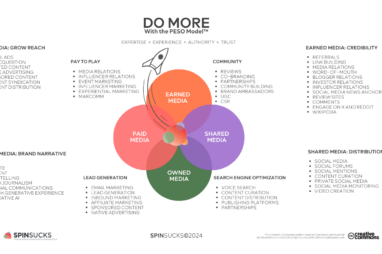Being invisibly visible
The emotional toll of working in public relations
About the author
Sophia Danielsson-Waters is corporate communications manager at The Go-Ahead Group plc. She wrote this thought leadership article earlier this year as part of a CIPR Professional PR Diploma assignment.

No matter how pious we may claim to be, there’s something in all of us that loves to revel in the misfortune of others. In fact, Schadenfreude is one of the reasons that we’re continuing to watch The Apprentice every year – that’s according to a YouGov poll, anyway. There’s something satisfying about seeing ostensibly clever people making bad decisions.

This rings true off screen, too. Organisations hit the headlines more frequently for so-called “PR Disasters” than for positive news stories. During the Deepwater Horizon oil spill in the Gulf of Mexico in 2010, multinational oil and energy company BP’s then-CEO (in)famously stated “I’d like my life back” during his apology. The quote went viral and was a reported factor for losing his job.
More recently, the Tate Modern reached the national news in 2017 when an internal note was leaked. The note asked staff to contribute towards a boat for the departing CEO’s leaving present. This didn’t sit well with the workers who were allegedly being paid lower than the London Living Wage.
These stories are good dinner party anecdotes, but more deeply are rooted in the lack of empathy between organisations and the public or organisations and their own employees. Yet mistakes don’t happen in a vacuum. It’s easy to make a mistake in every job – the problem when you work in communications, though, is more people see it.
A cycle of negativity
In 2013, the BBC published the results of an investigation titled: “London NHS spends £13m on public relations”. The money, the article posits, could have gone towards: recruiting 600 nurses, providing 3,250 hip replacements and providing treatment for 200 children with cancer. These carefully-chosen examples were accompanied with a quote from the CEO of the Patients’ Association: “Many will ask whether this funding would be better spent on medical doctors, rather than spin doctors.”
Ironically, the PR industry perhaps doesn’t have the best public image. The idea of “spin doctors” invokes the image of a person who deceives truths, whether it’s hiding and obscuring bad news stories or promoting unbalanced survey results.
Elizabeth Bridgen, a lecturer at Sheffield Hallam University, has likened the communications profession to “dirty work” – something that carries a physical, social, moral or emotional taint. She argues it is the latter: “where people use and interact with their emotions […] that society may not know about or would rather didn’t exist”.
Lord Bell, Margaret Thatcher’s former spin doctor who spearheaded the “Labour isn’t working” message, said in 2010 to The Guardian: “We’re not an international ethics body, we do communications work”. In 2015 his firm was revealed to be profiting from foreign regimes with some of the world’s worst human rights records. Of course, this is an extreme example, but it doesn’t help promote communications as an ethical profession to the wider public.
Bridgen analysed the writings over a 13-month period of journalists from industry magazine PR Week for her article “Public Relations as Dirty Work”. She found that journalists would leap on “relatively minor transgressions” by communications professionals, “turning them into headline news’. This attitude carried over to the press, which carried over to the public. Who can blame the BBC for questioning the validity of PR activity when they are fed negativity from industry experts themselves?
Other “tainted” professions vary from funeral parlours and refuse collectors to bankers and prison guards. However, the communications sector has an additional burden: proving why their job should exist in the first place. The Chartered Institute of Public Relations (CIPR) weighed in on the BBC’s investigation, stating: “The campaigns aimed to save the amount of time and public money spent on public health issues, which can be prevented at source by information provision and raising awareness.”
Historically, it has been hard to prove communications’ financial return on investment. Just as a direct link between media coverage and a successful product is impossible to prove, it’s tricky to establish a connection between strong internal communications and keeping people in the workplace. There are societal returns on investments, of course, for example how the public or colleagues perceive a company’s brand, reputation or culture, but this is harder to measure and a long-term challenge for the industry.
This creates a constant pressure to prove your job’s worth. Even in my first role in Internal Communications I was told to “watch myself” during company restructures, as “Internal Comms is always the first to go.”
A study by the world’s largest professional body for PR – the PRCA – indicates 41% of communications professionals worry they are not good at their job. They contrast this with “other sectors”, which sits at a purported average of 13%, although we’d need to see a breakdown of professions for this to be truly meaningful.
I do give a damn about my reputation
One of the strongest arguments for communications as a profession is reputation management. A good reputation lends an organisation more weight, credibility and customers. Interestingly in March 2020 the CEO of BP announced through LinkedIn the company would be stopping worldwide reputation advertising and would channel money into progressive climate policies. You could argue this is simply a clever way of answering public demand – promoting sustainability credentials being (maybe cynically) the 2020 form of reputation management.
Communicators must embody and understand the psyche of public, press or politicians (if they’re communicating externally) and company culture (if they’re communicating internally). Over the past fifteen years, the sector has embraced digital media. For the first time, professionals can talk directly with the public. As consumers, we expect companies to interact with us, and expect public apologies when they make mistakes. A simple misspelling of a person’s name can go viral if it’s tweeted, for example, by the US Department for Education. The professional is expected to embody its organisation and values – that really is the point of their job.
However, this is also capitalising on the blurred lines between professional life and private emotions. Ever more frequently, communications professionals are pressured to create their own tailored online presence for their personal accounts to demonstrate themselves as a marketable commodity or product. There’s no luxury to make a misstep – you must be always ‘on’ everywhere – the most visible invisible person in the room.
People can, and have, lost their jobs for posting something on their personal social media that did not align with their company’s values. When Head of Corporate Communications for technology holding company IAC Justine Sacco became an internet celebrity for a tweet that linked race and AIDs, it went viral and cost her job (for a short time, anyway). Although it’s hard to understand why she didn’t think before she posted, the example demonstrates how a flippant comment can cost someone’s career.
Technology for young millennials and Gen Zs isn’t new; it’s ubiquitous. It always felt strange to me, as a mid-millennial, to put “Microsoft Office” as a skill on my CV and for it to be seen as an advantage; it’s software I’ve used since I started primary school.
Bridgen conducted a survey of seven communications professionals, in an essay titled “Emotional labour and the pursuit of the personal brand”. She found that many professionals actually enjoyed working out of hours on their company’s social media accounts – with one respondent calling it a “form of relaxation […] to fill a dull evening.”
This study must be taken with a grain of salt: a limited number of people were surveyed, and those surveyed were under 35 years old. While this considers the fact that businesses are profiting from their employees’ out-of-hours enjoyment, it also doesn’t consider the examples where companies have faced the wrath of outgoing individuals. Even Donald Trump’s Twitter account was once deleted at the anger of an outgoing employee.
Emotional labour
Communicators must be “always on”, but also expend their own emotions by a constant need to be empathetic. Liz Yeomans, PR academic, explained in her essay “Empathy in Public Relations” that it is one of the core traits recruiters seek for communications roles, and is especially valued in times of crisis. This can be, for example, death or injury, serious incidents, terrorism or a breakdown within the organisation.
A communications professional has to judge emotionally how to deal with high-pressured, sensitive situations. Deaths by suicide occur every 36 hours on the UK rail network, and in rail communications it’s hard to find someone who hasn’t been affected by an incident. But unlike the trauma management that is offered to drivers, conductors or platform staff, it’s rarely used by communicators. It’s simply part of their job.
That is, until someone snaps. A customer service representative on Twitter who worked for rail operating company LNER went viral in March 2020. They asked for customers to have “perspective”, stating: “Their suffering and that of their family and friends’ pales in comparison to your missed meeting”. It warrants the point that more safeguards and mental health support should be in place for communicators.
The practice of “crisis communications” is complex, and often seen – unfairly – as a reserve for the most “capable”. None of us know how we will act in a crisis – even if all the safeguards are in place and it’s happened 20 times before. Heather Yaxley, a communications academic who worked in the automotive field said: “It is important to normalise rather than stigmatise practitioners who feel the strain of a crisis or who experience mental health conditions”.
This is a strong point: the sector needs to be kinder and fairer. The CIPR’s 2019 “State of the Profession” report indicated that one-fifth of communications professionals have a diagnosed mental health condition. Although this wasn’t an externally-verified study, it’s a figure that’s hard to ignore.
Nothing is never anyone’s fault
But of course, people choose where they work. No one holds you at gunpoint and tells you to go into communications. Professionals primarily work in three settings: in an agency, in-house or as freelance consultants.
Thomas Bivins, who has written extensively on ethics and PR, claims there are two aspects to people’s roles: the “functional obligations” – e.g. the tasks in the job description, as well as the “moral obligations”, which for PR could be be “don’t lie to the media” or “use language responsibly.”
With an agency environment, there is an active choice which organisations you want to pitch to and work alongside. It is also their client’s discretion whether to go with the agency’s ideas, but that doesn’t mean the agency is absolved of blame if something goes wrong.
In-house communicators are expected to embody their company’s ethos, yet, they face bureaucracy, hierarchical structures and pressure to always work in teams. According to a report from Watson Helsby, a PR headhunting firm, only 51% of FTSE 100 companies have a senior communications professional on their executive board. This indicates that top-level decisions may not come from someone even trained in the industry.
At the time of writing Coronavirus (COVID-19) has become a sudden, pressing issue on every communications agenda. A communication from the CEO (often written and definitely edited or checked by a communications person) has appeared in inboxes from every organisation – be it craft companies, food boxes, airline services and local government. ‘Business as usual’ communications in multiple organisations have been halted, while job redundancies are occurring at an unprecedented scale.
We do not yet know how Coronavirus will affect the communications sector in the long term, but it will be interesting to see how this sustained period of worldwide anxiety will affect those responsible for communicating it and the lasting scars it will leave.
One positive we have seen is the amount of communications bodies who are rallying together to share best practice and provide free courses and support to those across the sector. Perhaps this will create a new era of kindness. Because, by God do we need it.
(Sophia’s article was written and submitted for her CIPR Professional PR Diploma in March 2020, before the COVID lockdown.)


